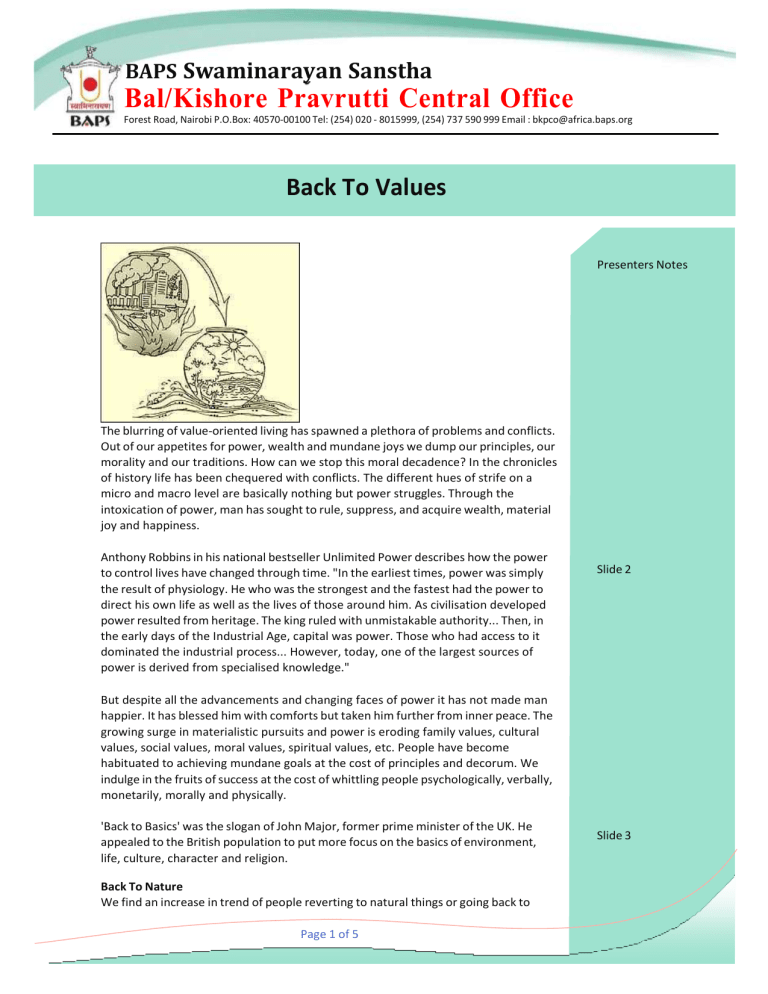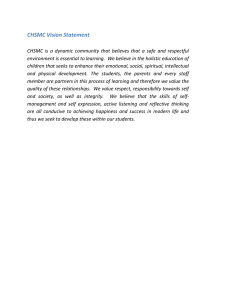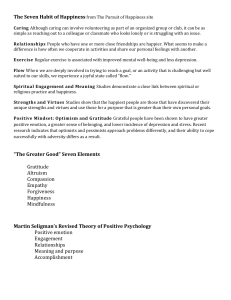
BAPS Swaminarayan Sanstha Bal/Kishore Pravrutti Central Office Forest Road, Nairobi P.O.Box: 40570‐00100 Tel: (254) 020 ‐ 8015999, (254) 737 590 999 Email : bkpco@africa.baps.org Back To Values Presenters Notes The blurring of value‐oriented living has spawned a plethora of problems and conflicts. Out of our appetites for power, wealth and mundane joys we dump our principles, our morality and our traditions. How can we stop this moral decadence? In the chronicles of history life has been chequered with conflicts. The different hues of strife on a micro and macro level are basically nothing but power struggles. Through the intoxication of power, man has sought to rule, suppress, and acquire wealth, material joy and happiness. Anthony Robbins in his national bestseller Unlimited Power describes how the power to control lives have changed through time. "In the earliest times, power was simply the result of physiology. He who was the strongest and the fastest had the power to direct his own life as well as the lives of those around him. As civilisation developed power resulted from heritage. The king ruled with unmistakable authority... Then, in the early days of the Industrial Age, capital was power. Those who had access to it dominated the industrial process... However, today, one of the largest sources of power is derived from specialised knowledge." Slide 2 But despite all the advancements and changing faces of power it has not made man happier. It has blessed him with comforts but taken him further from inner peace. The growing surge in materialistic pursuits and power is eroding family values, cultural values, social values, moral values, spiritual values, etc. People have become habituated to achieving mundane goals at the cost of principles and decorum. We indulge in the fruits of success at the cost of whittling people psychologically, verbally, monetarily, morally and physically. 'Back to Basics' was the slogan of John Major, former prime minister of the UK. He appealed to the British population to put more focus on the basics of environment, life, culture, character and religion. Back To Nature We find an increase in trend of people reverting to natural things or going back to Page 1 of 5 Slide 3 nature's ways. Initially, our ancestors lived in the forests, caves and rural surroundings. Today, in our urban sprawls and city atmosphere we create waterfalls and forests in our homes to soothe our frayed nerves. Wini Brewer, an artist in Morongo Valley, California, purchased five acres of property in a desert for its starry vista in 1996. All because the city's whitewashed skies, due to excessive commercial lighting, did not allow her to savor the starry heavens. It is mind‐relaxing and heartening to look at the natural, glittering sky. Even getting away from the din of urban life and listening to nature's sounds rubs‐off mental tranquility. Nature has the power to infuse energy, enthusiasm and peace in our minds. In the town of Miyazaki on the Japanese island of Kyushu, 1500km south of Tokyo, there is an artificial beach. The chlorinated, salt‐free waters surge and roll like an ocean. The 140m wide ocean, 85m shoreline, 600 tons of crushed, polished pebbles are canopied by a 200m retractable roof. The chirping of birds filter through a sound system and synthetic palm trees flutter in a piped‐in breeze. About 10,000 people can frolic and swim in the temperature‐controlled waters. Recreating nature's shores with a guarantee of a perfectly controlled weather echoes man's affinity for the joys of nature. People in Gujarat flock to restaurants that have a natural ambience. The soft illumination of oil lamps, rural seating arrangements, traditional village flavor of singing bards and puppet shows and menu of rotla, khichdi, makhan and pickled chillies are the in‐things. The pastoral character provides a tranquil change and satisfies the inner cry to be rustic. Presenters Notes Slide 4 Slide 5 Slide 6 When nature's wealth of beauty and serenity has the power to bestow happiness and vitality to man, then what of the joys he would be blessed with if he focuses on God ‐ the creator of nature! The more he imbibes God's virtues and follows His decrees, the permanent his experience of happiness becomes. To solve the raging conflicts within and without there is a dire need to reinforce values and faith in our lives. Back to Morality & Spirituality Henry David Thoreau, the American poet, prods America to give precedence to and foster morality in life. He said, "Through your scientific genius you have made of the world a neighborhood but you have failed to employ your moral and spiritual genius to make it into a brotherhood. So, America, the atomic bombs you have to fear today is not merely that deadly weapon which can be dropped from an aeroplane on the heads of millions of people, but that atomic bomb which lies in the hearts of men, capable of exploding into the most staggering hate and the most devastating selfishness. Therefore I urge you to keep your moral advances abreast of your scientific advances." T.S. Eliot, the English poet and writer of plays was born in the USA. He emphatically trumpets the need for inner tranquility, saying, Page 2 of 5 Slide 7 The endless cycle of ideas and actions, Endless invention, endless experiment, Brings us knowledge of motion but not of silence. Knowledge of words and ignorance of the Word. All our knowledge brings us nearer to death, But nearness to death no nearer to God. Where is the life we have lost in living? Where is the wisdom we have lost in knowedge? Where is the knowledge we have lost in information? The cycles of Heaven in twenty centuries, Brings us farther from God and nearer to dust. The surgical eloquence of T.S. Eliot has revealed the stark consequences of all our materialistic endeavors. One often gets so consumed or lost in mundane effort that one fails to grasp the spirit in one's actions. The Mundaka Upanishad tells the story of Naradji, who in spite of having attained scholarly accomplishments felt unhappy. He went to sage Sanatkumar and requested him to show him the path of knowledge. Sanatkumar enquired what he had learnt. Naradji replied: "I have learnt the four Vedas, Puranas and Itihas (history), the method of remembering and repeating the Vedas, the technique of shraddha ceremony, grammar, philology (study of literature and disciplines relevant to literature), mathematics, astronomy, astrology, science of augury, jugglery, logic, ethics, knowledge of gods of different forces, science of animals, science of war and many others. I feel I have only verbal knowledge but not knowledge about the Supreme. I am full of sorrow and grief. I hope you will lead me out of all these by favoring me with true knowledge." Sanatkumar then instructed him upon the knowledge of God and he experienced peace. So mere knowledge, wealth, power, fame, etc. leaves the individual with temporary elation and joy. Once its intoxication wears off one is left in misery and conflict. 'Back to Basics' is the watchword to remedy the sickness of one's soul. Steven Covey in his international bestseller The 7 Habits of Highly Effective People distils 200 years of success literature and arrives at two types of ethics: Personality Ethic and Character Ethic. The former, Personality Ethic, he says, is superficial and focuses on social image consciousness, techniques and quick‐fix solutions. And Character Ethic focuses on the foundation of success ‐ things like integrity, humility, fidelity, justice, patience, simplicity. The Character Ethic deals with basic principles of effective living, and that people can experience true success and enduring happiness as they integrate these principles into their basic character. Benjamin Franklin (1706‐1790), the American scientist, inventor, educator, diplomat, politician and humorist, resolved at the age of twenty‐two to integrate virtues in his life. In his project to achieve moral perfection he decided to focus on thirteen virtues for a period of thirteen weeks and repeat the cycle four times every year. Every week he would give strict attention to one virtue and avoid breaking it. Whenever he lapsed he made a note of it. The virtues, of which he focussed on some aspects only and experimented were: 1. Temperance: to eat not to dullness and drink not to elevation 2. Silence: Speak only that which benefits others and yourself. Avoid trifling conversation. Page 3 of 5 Presenters Notes Slide 8 3. Order: Let all your things have their places. 4. Resolution: Resolve to perform and perform what you resolve. 5. Frugality: Waste nothing and make expenses to do good to others. 6. Industry: Lose no time and do something useful. Cut off all unnecessary actions. 7. Sincerity: Use no hurtful deceit. Think innocently and justly. 8. Justice: Do no wrong. 9. Moderation: Avoid extremes. 10. Cleanliness: Tolerate no uncleanliness in body, clothes and habitation. 11. Tranquility: Be not disturbed at trifles. 12. Chastity: Rarely engage in sexual activity and that too never to dullness, weakness, or injury of your own or another's peace or reputation. 13. Humility: Imitate Christ and Socrates. During the course Benjamin Franklin realised the extent of faults he had and the satisfaction of seeing them diminish. Though he was unable to repeat or sustain his efforts in pursuing the virtues, the experiment blessed him with a better conviction to permanent happiness. An interesting example of Spiritual Ethic‐oriented people are the Mennonite and Amish Christian communities in N.America and 60 countries of the world. Members of the old order, have maintained their puritanical traditions ever since its birth in 1525 and 1693 respectively. Most Old Order Amish drive horse drawn carriages, dress plainly, refrain from the use of electricity, emphasise occupations close to the farm and home. The Amish and Mennonites believe that one's faith is reflected through the way one lives. They practice humility, simplicity and modesty. Most Old Order members manage to enjoy life without the help of the entertainment industry. Many have fun without television, toys, golf clubs, etc. And in the more traditional homes books are at a minimum. They read the Bible, have some prayer and inspirational books, but almost no modern non‐fiction books. To preserve values and their religious traditions, many of the orthodox Amish and Mennonite members have adopted a life of discipline and restraint. Their focus is religion and values for a happier existence. The orthodox Jews abstain from use of electric light, travel and work on every Sabbath day and spend the day in prayer, reading and introspection. Bhagwan Swaminarayan (1781‐1830) established an illustrious community of sadhus and devotees strictly wedded to moral and spiritual disciplines. He advocated five strict cardinal disciplines for His sadhus, namely, Nishkam (absolute brahmacharya), Nirlobh (vow of poverty), Niswad (non‐taste), Nisneh (detachment from family and mundane things) and Nirman (humility). For the householders He prescribed social purity, abstinence from liquor, meat, stealing and illicit sex. His emphasis on a Character Ethic and Spiritual Ethic on life for permanent happiness spread to form the Swaminarayan Sampraday. In short, to grasp the true spirit of life and savor permanent joy one has to be wedded to morality and religion. In 1995, Mumbai, a reporter asked Pramukh Swami Maharaj, "Looking at our discrepant world today which is full of crime, immorality and all sorts of sins, do you Page 4 of 5 Presenters Notes Slide 9 Slide 10 think things will improve?" Swamishri replied, "Only if we go back to our culture and become rooted in morality and spirituality will we be able to resist and fight off the growing influences of materialism." On 24 November 1999, Pramukh Swami Maharaj was engaged in doing darshan of Thakorji in Bochasan mandir. When he came before the shrine of Laxmi Narayan Dev, Laxmiji was adorned in a yellow sari. A sadhu then told Swamishri that a senior sadhu had suggested that the chandlo on Laxmiji's head should be red instead of yellow. Swamishri nodded affirmatively saying, "Yes, that's right because Narayan has a red chandlo." "But Swamiji, since Laxmiji is adorned in a yellow sari the chandlo should also be yellow to match the sari. Whatever color the sari be that should be the color of the chandlo," argued the sadhu. Swamishri tellingly responded, "Should one match with the sari or with Narayan!" Swamishri's reply underlined the necessity to be God‐centred, rather than mundane‐ centred. Back to basics means having a value‐oriented, God‐centred life. Today, we knowingly or unknowingly twist our values to mundane statements of fashion, entertainment, modernity and indulgence. We are prone to changing our modes of living, eating and working according to the fast moving fads in society. And that is why Pramukh Swami Maharaj often cautions, "We have become modern but not civilised." We should not relegate ourselves by trading our values for material pleasures. We should not crucify our traditions and morals for the sake of indulgence or lucrative opportunities. Neither should we compromise or take liberties with the fundamentals of life for wanton behavior. A person anchored to values, morality and spirituality is blessed with power, tranquility and eternal happiness. Dr. Radhakrishnan, former President of India and a great scholar who held a seat at Oxford University, says, "The glory of India is not in her industrial development or material welfare or nuclear progress, but is in the maintenance of its spiritual heritage intact." He also stated, "What is missing in our age is the soul; there is nothing wrong with the body. We suffer from the sickness of spirit. We must discover our roots in the eternal and regain faith in the transcendent truth which will order life, discipline discordant elements, and bring unity and purpose into it." A return to values is the only panacea to all our inner conflicts. Without it we shall live a life of turmoil and slavishness. Solutions To reinstate ourselves we need, along with our mundane duties, to practice dharma. Going back to values means being committed to: Reading the holy scriptures. Weekly attendance to the Mandir. Listening to spiritual discourses. Spending time with one's family. Engaging oneself in volunteer work to reinforce the spirit of service. Good company. And the spiritual association of a bona fide guru. Page 5 of 5 Presenters Notes Slide 11


